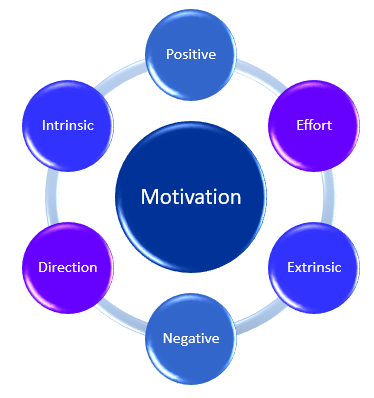Motivation is an inner desire to change behavior, thoughts, or feelings, caused by either internal or external sources.
Motivation Defined
Motivation is the force that causes a person to act or behave in a particular way. This force or drive can be caused by several different elements. Some of these elements can be external, while others can be internal. External factors include money, praise, or awards, while internal factors include a feeling of purpose, personal satisfaction, or the challenge of the task.
About Motivation
The phrase motivation is derived from the word “motive”. Motive can be defined as wants, drives, or impulses within an individual that causes them to act a certain way. Although a person’s motivation cannot be observed directly, we can infer the reasons why a person does the things that they do based on observable behaviors.
Intrinsic or Extrinsic
Motivation can be either intrinsic or extrinsic. Intrinsic motivation comes from within an individual, while extrinsic arises from external sources. Intrinsic centers on doing an activity because it is enjoyable and personally rewarding. Extrinsic involves doing something to earn a reward or avoid punishment.

Positive or Negative
Motivation can be either positive or negative. Positive motivation occurs when a person knows that they will be rewarded for accomplishing a certain task or changing a particular behavior. On the contrary, negative motivation is the act of forcing a specific behavior by means of fear, threat, or punishment. Basically, positive motivation is when a person behaves a certain way to get rewarded, and negative motivation is when a person behaves a certain way to avoid something bad.
Three Components of Motivation
Motivation is centered on a person’s efforts to achieve a desired goal. The level of motivation can be measured by an individual’s direction, intensity, and persistence of effort toward attaining that goal. The level varies between different individuals, circumstances surrounding them, and within each individual themselves at different times. Even though levels vary, motivated individuals stay with a task long enough to achieve their goal.
The levels are affected by three components;
- Direction = Target the effort is directed toward
- Intensity = How hard a person tries to achieve their goal
- Persistence = How long a person maintains their effort

Direction refers to the target or goal to which an individual focuses their efforts. For example, a person heads down a path to achieve weight loss, a sports trophy, or academic achievement. Direction is the first step as it determines where the person wants to ultimately end up.
Intensity is how hard a person tries to reach their goal. It is the degree to which a person goes to achieve their goal. For example, a person may workout six days a week in order to run a marathon, or a student may load up on classes in order to graduate in three years.
Persistence is how long a person maintains their effort towards achieving their goal even though obstacles may exist. For example, a person may come across obstacles such as illness, lack of money, or lack of support but continues on despite these difficulties.
Motivation is Dynamic
Motivation is very dynamic; meaning it can change based on various influences. For example, a person can become motivated to enter a race for the personal satisfaction of competing, but that may increase if they find out there is a monetary reward for winning the race. On the flip side, a person can be initially motivated to enter a race when they hear about a monetary payout to the winner but lose that desire when the desire to practice diminishes.
Additionally, motivation can be dynamic because there are normally several factors influencing it at any one time, and these are constantly changing in degrees of desire. For example, a person may want to exercise for fun, weight loss, personal challenge, health benefits, stress relief, or improved body physique. The intensity of each of these factors will vary at different times for different reasons.
